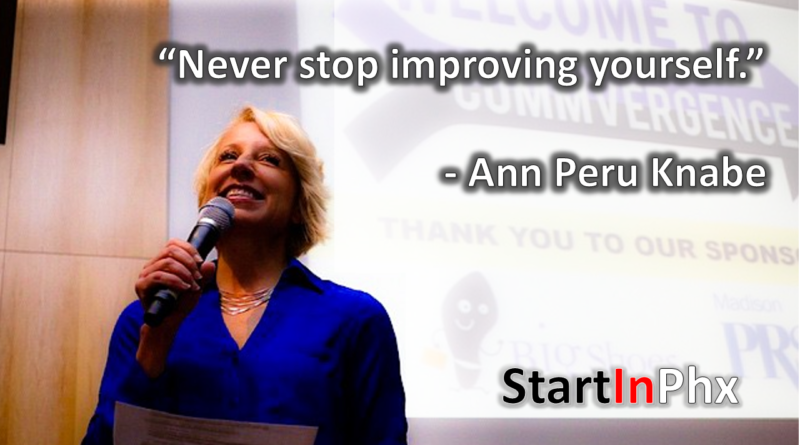A Career in Public Relations and a Duty to Country
Colonel Ann Peru Knabe has a Ph.D. from Marquette University and has taught communications at the university level for over twenty years. Her experience as a private sector public relations practitioner is reinforced by her accreditation from the Public Relations Society of America.
Ann’s accreditation in PR comes with a military emphasis, which has served her well as a Public Affairs Officer in the United States Air Force Reserves. She is currently serving a three year tour of duty as the Dean of Students for the International College of Security Affairs at the National Defense University in Washington D.C.
In this week’s Career Success Q&A Ann shares the fundamentals of professional development and life balance she has used to pursue her wide range of professional passions. She also talks about how she leveraged these fundamentals to overcome the challenges she’s encountered along the way. Among those challenges were four tours of military service that stretched her Ph.D. program out over ten years.
An underlying theme of Ann’s career is to give yourself permission to pursue your interests and passions. Ann will be the first to admit her experience extends into a lot of fairly unrelated territories. But looking back, Ann’s appointment as Dean of Students at the National Defense University is not one she would have considered twenty years ago.
With every new pursuit however, Ann has found even more opportunity. Things she didn’t know she’d ever want for her career are now within reach.
Career Success Q&A
How do you describe your line of work?
Relationship builder, problem-solver, fire-fighter. On paper I am the Dean of Students for the International College of Security Affairs at National Defense University.
It’s a stuffy title, but an amazing line of work to be in. I am responsible for a couple hundred students – a larger portion are international officers.
Their average age is 42, and they are all established leaders in either the US military or federal government or our partner countries overseas. With such a diverse student body, there are a multitude of issues that can arise on any given day.
How long have you worked in this role?
I just finished one year of my three year tour. It’s a reserve military tour, and at the three year mark I will return to my civilian job teaching college back in Wisconsin.
What do you like most about your work?
The challenge and the students! Every day is so unpredictable. It is fast-paced and I never have [time] to really take a lunch, but I am never bored.
What level of education or formal training have you had?
I have an interdisciplinary Ph.D., and two master’s degrees: one in national security and resource strategy, and one in communication. Plus, I am accredited in public affairs.
What kind of experience did you have before you began your current role?
I taught college for more than 20 years, and served in the US Air Force Reserve for 30 years. Along the way, I worked as an agency consultant, freelance writer and started my own business.
Do you have a mission statement or a guiding philosophy for your career?
Never stop improving yourself — you should always be striving for more and pushing yourself to the level of discomfort. If you get too comfortable, you grow stagnant.
What excites you most about your career right now?
Every day I face new challenges. I have an amazing boss who has empowered me to try new approaches. Every year we have a new batch of master’s students who will change the world after graduating from our program.
What excites you about the future of your career?
Our program is relatively young, so there are so many new exciting partnerships to develop, programs to try, and areas to improve.
What do you consider to be your greatest career accomplishment so far?
Juggling a full-time job, a part-time Reserve commitment, four deployments, and a family. Even with all that going on, I was able to earn a Ph.D.
How often do you read outside of work?
I read the Wall Street Journal every morning.
Would you say reading has had a significant impact on your career?
In my business, one needs to be acutely aware of world and domestic issues. Whether I’m working as the Dean of Students, or in the world of PR, or doing Air Force duty at the Pentagon, I need to be aware of what’s happening in the world around us.
What role has mentorship had in your professional development?
Mentors have helped shape me into the person I am today.
I earned my accreditation in PR 20 years ago because a mentor pushed me. As a reservist, mentors have encouraged me along the way as I grew from the lowest enlisted rank in the military to an officer, and now as a Colonel.
Including people you study or admire from afar, who are your most influential mentors and why do you admire them?
In the military, senior officers (both male and female), from a PR perspective, there are a couple agency VPs who always seem to have sound advice.
Do you actively mentor other professionals?
Yes – As a college professor, I have a constant flow of students and grads who are seeking mentors. I also mentor officers in my field of public affairs, and recently set up a formal mentoring program for accreditation.
I also serve as a ‘Connector’ – Malcolm Gladwell popularized this term in describing people in a community who know large numbers of people and who are in the habit of making introductions and connecting people.
A connector is the social equivalent of a computer network hug. I know people across an array of social, cultural, professional and economic circles, and make a habit of introducing people who work or live in different circles.
What has been the biggest challenge you’ve had to overcome in your career?
Juggling my professional interests and a family — I am really lucky I married a strong partner who picks put the slack when I am running full-speed ahead.
He’s a pretty amazing guy and successful himself, but knows it takes two to keep things rolling ahead.
What have you found to work really well for fostering your own professional growth?
Instead of thinking about trying to improve myself, taking risk and moving ahead. Less talk, more action.
What do you believe has made the greatest contribution to your career successes?
Probably my husband – he’s my greatest cheerleader. Everyone needs a cheerleader on the days they feel tired or lack motivation.
I remember one time – just thinking I’d just been working on [my dissertation] way too long, and I hadn’t fallen apart yet because I don’t have my Ph.D.
I was telling my husband this –and that’s when your partner or supporter comes in. When you are weak or – I had just decided that I had done this long enough and it hadn’t happened.
He came in and said ‘No, don’t give-up. Are you kidding me? You’ve dedicated eight years of your life – this is in reach.’
Sometimes it is someone else who can help you when you are ready to give up.
What is a professional challenge you’re still looking for a solutions to?
After this current job gig ends, I would like to pick up my crisis communications consulting business again, and dive into some new business.
Would you consider yourself a goal setter?
Yes – Big goal setter. But sometimes I am also ‘Action on Target’ — in other words, taking opportunity of things that pop up out of nowhere.
How have military deployments impacted your career goals?
Your first priority coming back is family – to get your family reunified. The second is your job – to get reintegrates at work… The third for me – and it always came last – was the dissertation. Because of the deployments having a way of unravelling me four times, it always took forever to get on track.
It comes back to priorities. You have to think, ‘OK what’s really a priority?’ I’ve done a lot of interesting things, but my priority is my family. If I had to walk away from all of this [for my family], I could.
Thinking I’d gone [so] long without my Ph.D. – it set me back, and it made it harder and harder with each [deployment]. But, sometimes it makes you all the more tenacious, because you’ve been working on it so long.
Has there been a specific method of goal setting that has contributed to your career successes?
SMART Goals: Specific, Measurable, Attainable, Realistic, and Time-Bound
Telling people about your goals – verbalizing them to other people makes you more likely to commit to them.
What are a few of your current career goals?
Professionally: Re–start my business that has been on hold [and] get a realtor’s license.
Personally: Get involved in the community.
Do you have a set of fundamental principles you follow as a conscious way of ensuring you’re always improving yourself as a professional?
I think the Air Force values have universal appeal: Service before Self, Integrity and Excellence in all you do.
You’ve worked in both the private and public sector as well as in academia. How have each of these settings impacted your professional development?
I think you can learn a lot from all these areas and take best practices.
For example, the Air Force is really great with crisis communication, and I have been able to parlay these skills into my agency and academic work.
Academia and accreditation really emphasize measurable results and return on investments in PR planning, and I have been able to work that into strategic communication plans for the military.
What do you think is most important for students to keep in mind while they are working towards a degree?
Be open to new ideas and concepts. Leverage your professors, network with professionals, and get as much experience as possible, even if it’s volunteer work.

What is the best way for people to connect with you?
LinkedIn: https://www.linkedin.com/in/annknabe
Have questions about your own professional development or the details of Ann’s career success?
Ask your questions in the comments below and we’ll be sure to help in anyway we can!
You can receive articles like this as well as other great content we suggest from around the internet directly to your inbox by subscribing to our weekly newsletter #StartTuesday




